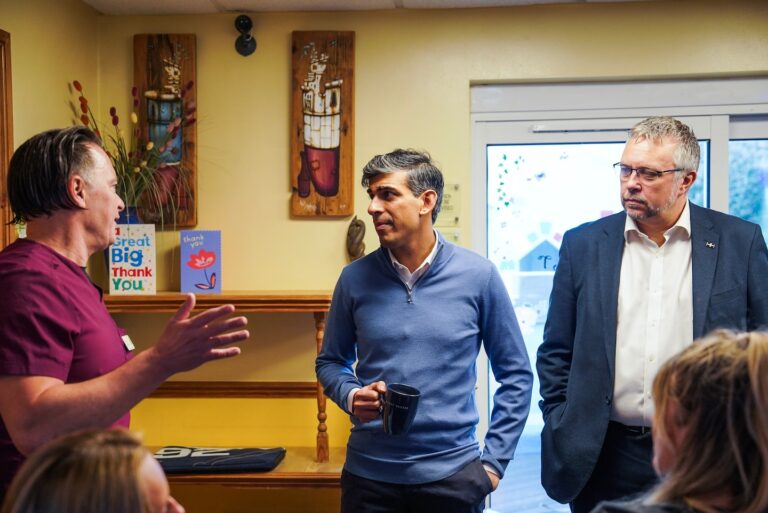This helps to explain how dentistry, which accounts for a small part of the NHS budget, has emerged as one of the top local issues in the U.K. general election. Brits go to the polls this Thursday.
Prime Minister Rishi Sunak and Labour’s Keir Starmer have been grilled about dentistry in live television debates. All of the major parties mention dentistry in their manifestos.
Labour says it’s time to “stop the rot” and says it will reform a dental contract between dentists and the NHS, provide 700,000 more urgent dental appointments, recruit new dentists to the areas most in need, and introduce supervised toothbrushing in schools. The Conservatives say they will reform the dental contract, introduce financial incentives for dentists to work in remote areas and ensure new dentists work in the NHS for a time or pay back training costs.
When the NHS began in 1948, dentistry was free for patients. But by 1951, charges were introduced. Some people are still exempt, such as children and those on low incomes, while a majority of adults pay a subsidized rate. But securing an appointment with an NHS dentist can be hard. Earlier this year, the police were called to manage crowds who gathered outside of a newly opened dental practice in Bristol.
GET CAUGHT UP
Stories to keep you informed
Waters, 53, vividly recalls the first time she took matters into her own hands. She is among the 10 percent of Brits who say they have performed dentistry on themselves.
She said she had called over 50 NHS dentists within a 70-mile radius of Peterborough, the closest big city to her village, but none of the dentists were accepting new patients. An infection left her with incredible, nonstop pain. Desperate, she ripped off a piece of paper towel so the tooth “wouldn’t slip” and then “pulled and pulled” on it. The pain was too much at the time, but now she says, “all I want is to be able to smile like I used to.”
Mark Jones, founder of the activist group Toothless in England, said that stories he has heard of the measures some people have taken seem like “something out of a Charles Dickens novel.”
England has about 11,000 dental practices. They operate like small businesses, with many providing a mix of NHS and private care. But dentists say that they are struggling to cover their costs with the money from the government, pushing them toward private practice.
A 2022 BBC survey found that 90 percent of dental practices were not accepting new adult NHS patients. A report by a parliamentary committee last summer concluded that “urgent” reform was needed and called on the government to ensure that everyone who needed an NHS dentist could access one within a “reasonable” time frame and distance. The government responded with a “dental recovery plan,” which included dentists being offered cash incentives to accept new patients.
The Labour Party, which is expected to win the election, is seen by voters as stronger on the NHS. But analysts say that bigger changes than those listed in party manifestos are needed.
Ian Mills, a professor in dentistry at the University of Plymouth, said that “unless you make radical change to the workforce and contracts, the best they can hope for is things don’t get much worse.”
Americans enjoy having a go at Britain’s reputation for bad teeth — think of Austin Powers’s discolored, crooked teeth or the “Simpsons” episode in which a young boy is scared into cleaning his teeth after a dentist shows him “The Big Book of British Smiles.” But a 2015 article in the journal BMJ challenged that stereotype, concluding that Americans have more missing teeth than the English and that the inequalities in oral health are wider between the rich and the poor in the United States than in England.
But activists in the United Kingdom are concerned that inequality here is widening and that there is increasingly a two-tiered system in England, in which those on higher incomes go private while those on lower incomes are more likely to be the ones struggling to find affordable dentistry.
Some U.K. residents find it is quicker and cheaper to get dental work done abroad. Rasel Syed, 44, a chef, lives across the street from an NHS dentist. But after he broke a tooth, he was told that the work by an NHS dentist would have cost about $2,500, with a waiting period of up to a year. A private dentist quoted $6,300. When the pain became unbearable, he booked a round-trip flight to Bangladesh, where he was born, and saw a dentist within an hour of his plane landing. The flight and the work cost about $1,300.
Tom Thayer, an oral surgeon who launched a petition on the issue, along with the British Dental Association and the Mirror newspaper, treats patients in hospital with injuries from DIY dentistry. “We have patients who can’t access care,” he said, “and if they can’t access care, things get worse.”


